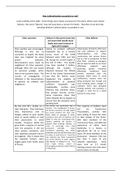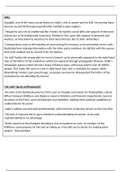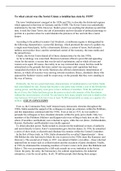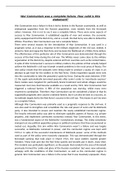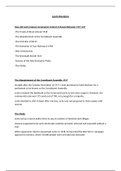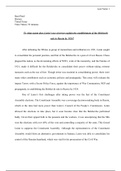CIE • History
Latest uploads for History at CIE. Looking for History notes at CIE? We have lots of notes, study guides and revision notes available for History at CIE.
-
153
- 0
-
20
Modules History at CIE
Notes available for the following courses of History at CIE
Popular books CIE • History

Graham David Goodlad, Patrick Walsh-Atkins, Russell Williams • ISBN 9781108739795

Chris Hinton, John Hite • ISBN 9780719573439

Charles River Editors • ISBN 9781512023749

James Kirchick • ISBN 9780300218312
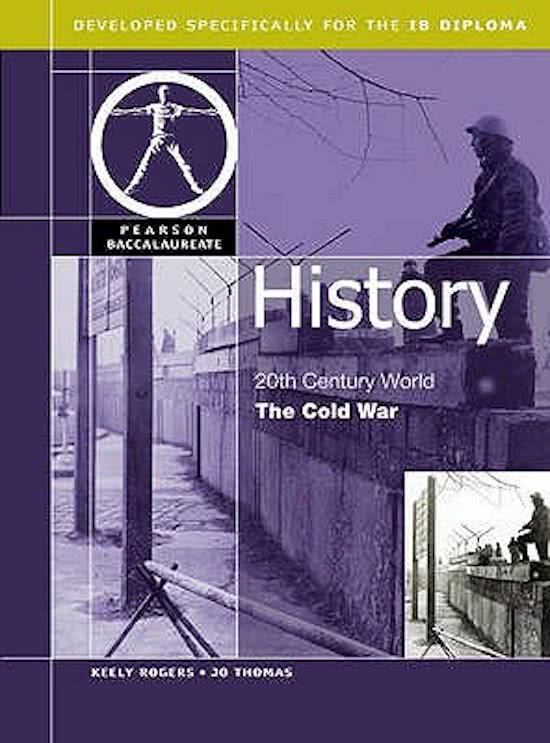
Keely Rogers, Jo Thomas • ISBN 9780435994372

Graham Goodlad, Patrick Walsh-Atkins • ISBN 9781108733922
Chris Corin, Terry Fiehn • ISBN 9781444124231

Adam West • ISBN 9781925989595
Latest notes & summaries CIE • History
Stalin; formerly known as Iosif Vissarionovich Dzhugashvili, was a Marxist and an avid follower of Vladimir Lenin. His involvement in the Bolshevik movement was due to his active violent attacks on the Tsarist government, through bank robbing and kidnapping to fund the revolution, allowing him to become one of Lenin’s closest associates. Despite his early success within the Bolsheviks, he was not considered to be among the list of natural successors; Trotsky, Bukharin, Zinoviev, Kamenev and Ki...
Stalin; formerly known as Iosif Vissarionovich Dzhugashvili, was a Marxist and an avid follower of Vladimir Lenin. His involvement in the Bolshevik movement was due to his active violent attacks on the Tsarist government, through bank robbing and kidnapping to fund the revolution, allowing him to become one of Lenin’s closest associates. Despite his early success within the Bolsheviks, he was not considered to be among the list of natural successors; Trotsky, Bukharin, Zinoviev, Kamenev and Ki...
Stalin; formerly known as Iosif Vissarionovich Dzhugashvili, was a Marxist and an avid follower of Vladimir Lenin. His involvement in the Bolshevik movement was due to his active violent attacks on the Tsarist government, through bank robbing and kidnapping to fund the revolution, allowing him to become one of Lenin’s closest associates. Despite his early success within the Bolsheviks, he was not considered to be among the list of natural successors; Trotsky, Bukharin, Zinoviev, Kamenev and Ki...
Stalin; formerly known as Iosif Vissarionovich Dzhugashvili, was a Marxist and an avid follower of Vladimir Lenin. His involvement in the Bolshevik movement was due to his active violent attacks on the Tsarist government, through bank robbing and kidnapping to fund the revolution, allowing him to become one of Lenin’s closest associates. Despite his early success within the Bolsheviks, he was not considered to be among the list of natural successors; Trotsky, Bukharin, Zinoviev, Kamenev and Ki...
A totalitarian state, is a where the central government of a state does not tolerate any parties with opposing views and exercises complete dictatorial rule over all or most aspects of life. Lenin, the leader of the Bolsheviks, took many measures in an attempt to create a totalitarian state, including the dissolution of Constituent Assembly, the use of decrees and the establishment of a secret police group called the Cheka. However there were also some ways in which he failed to achieve full tot...
A totalitarian state, is a where the central government of a state does not tolerate any parties with opposing views and exercises complete dictatorial rule over all or most aspects of life. Lenin, the leader of the Bolsheviks, took many measures in an attempt to create a totalitarian state, including the dissolution of Constituent Assembly, the use of decrees and the establishment of a secret police group called the Cheka. However there were also some ways in which he failed to achieve full tot...
A totalitarian state, is a where the central government of a state does not tolerate any parties with opposing views and exercises complete dictatorial rule over all or most aspects of life. Lenin, the leader of the Bolsheviks, took many measures in an attempt to create a totalitarian state, including the dissolution of Constituent Assembly, the use of decrees and the establishment of a secret police group called the Cheka. However there were also some ways in which he failed to achieve full tot...
A totalitarian state, is a where the central government of a state does not tolerate any parties with opposing views and exercises complete dictatorial rule over all or most aspects of life. Lenin, the leader of the Bolsheviks, took many measures in an attempt to create a totalitarian state, including the dissolution of Constituent Assembly, the use of decrees and the establishment of a secret police group called the Cheka. However there were also some ways in which he failed to achieve full tot...
A totalitarian state, is a where the central government of a state does not tolerate any parties with opposing views and exercises complete dictatorial rule over all or most aspects of life. Lenin, the leader of the Bolsheviks, took many measures in an attempt to create a totalitarian state, including the dissolution of Constituent Assembly, the use of decrees and the establishment of a secret police group called the Cheka. However there were also some ways in which he failed to achieve full tot...
A totalitarian state, is a where the central government of a state does not tolerate any parties with opposing views and exercises complete dictatorial rule over all or most aspects of life. Lenin, the leader of the Bolsheviks, took many measures in an attempt to create a totalitarian state, including the dissolution of Constituent Assembly, the use of decrees and the establishment of a secret police group called the Cheka. However there were also some ways in which he failed to achieve full tot...


